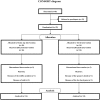Brain training game improves executive functions and processing speed in the elderly: a randomized controlled trial
- PMID: 22253758
- PMCID: PMC3256163
- DOI: 10.1371/journal.pone.0029676
Brain training game improves executive functions and processing speed in the elderly: a randomized controlled trial
Abstract
Background: The beneficial effects of brain training games are expected to transfer to other cognitive functions, but these beneficial effects are poorly understood. Here we investigate the impact of the brain training game (Brain Age) on cognitive functions in the elderly.
Methods and results: Thirty-two elderly volunteers were recruited through an advertisement in the local newspaper and randomly assigned to either of two game groups (Brain Age, Tetris). This study was completed by 14 of the 16 members in the Brain Age group and 14 of the 16 members in the Tetris group. To maximize the benefit of the interventions, all participants were non-gamers who reported playing less than one hour of video games per week over the past 2 years. Participants in both the Brain Age and the Tetris groups played their game for about 15 minutes per day, at least 5 days per week, for 4 weeks. Each group played for a total of about 20 days. Measures of the cognitive functions were conducted before and after training. Measures of the cognitive functions fell into four categories (global cognitive status, executive functions, attention, and processing speed). Results showed that the effects of the brain training game were transferred to executive functions and to processing speed. However, the brain training game showed no transfer effect on any global cognitive status nor attention.
Conclusions: Our results showed that playing Brain Age for 4 weeks could lead to improve cognitive functions (executive functions and processing speed) in the elderly. This result indicated that there is a possibility which the elderly could improve executive functions and processing speed in short term training. The results need replication in large samples. Long-term effects and relevance for every-day functioning remain uncertain as yet.
Trial registration: UMIN Clinical Trial Registry 000002825.
Conflict of interest statement
Figures


References
-
- Hedden T, Gabrieli JDE. Insights into the ageing mind: a view from cognitive neuroscience. Nat Rev Neurosci. 2004;5:87–96. - PubMed
-
- Nilsson L-G. Memory function in normal aging. Acta Neurologica Scandinavica. 2003;107:7–13. - PubMed
-
- Salthouse TA. Memory aging from 18 to 80. Alzheimer Dis Assoc Disord. 2003;17:162–167. - PubMed
-
- Yakhno NN, Zakharov VV, Lokshina AB. Impairment of memory and attention in the elderly. Neurosci Behav Physiol. 2007;37:203–208. - PubMed
Publication types
MeSH terms
LinkOut - more resources
Full Text Sources
Miscellaneous

